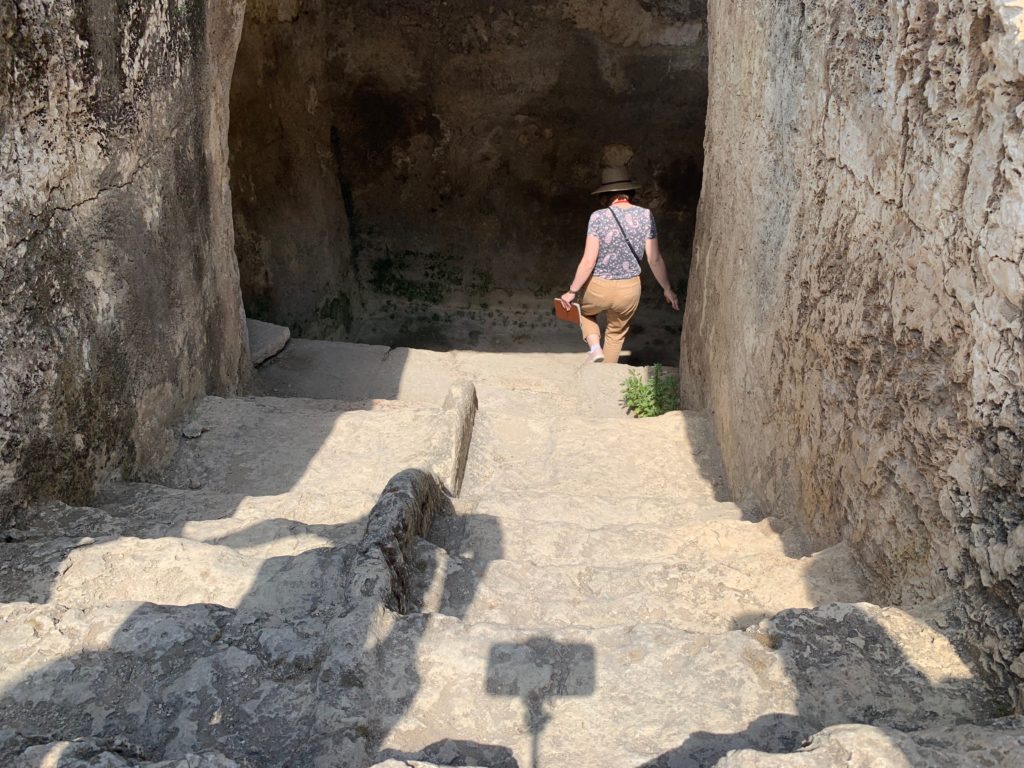“Don’t imagine yourself to be quite presentable when you
haven’t bathed in weeks.” (Proverbs 30:12 MSG)
This is one of many scriptures that makes more sense after our pilgrimage to Israel. As early as the second day, in the very first set of ruins, our guide pointed out the historical importance of bathing.
The public bathhouse was the pulse of Roman life: gossip was exchanged, deals struck and political fates were all decided within the warm stone walls of the caldarium (hot sauna). We found the remains of public bathhouses in every Roman ruin, but also in all of Herod’s palaces.
Not dissimilarly, the mikvah (purification bath) was paramount in Jewish culture; before a pilgrim entered the Temple they walked down one set of stairs, submerged in clean water to the top of their head and then rose a separate set of steps purified. Mikvah’s are found in Jewish ruins throughout Israel.

Note the separation wall between clean and unclean.
At first glance, this scripture appears to be connected to physical cleanliness, but when we know the historical-cultural significance of bathing, we realize it’s actually centered on spiritual cleanliness. If a Jew hadn’t been to the mikvah in a while, he had not participated in the purification rite. He had not submitted himself to the surrender and submergence, symbolically setting his flesh free from sin so he could worship and offer sacrifice.
We get a a spiritual odor when we haven’t surrendered to God in a while. There’s nothing magical about a bath, but there is something radical about confessing our need for God’s grace. A penitent sinner descending the impure side of the stairs is well-aware of his trespasses and eager to be washed clean, while the one who avoids the mikvah altogether has grown accustomed to his stench.
How does all this translate to today? We start to stink if we haven’t repented in a while. Daily confession is so good for the soul, it could be a personal requirement. It seems the longer we go without repentance, the less we are convinced of its necessity. On the contrary, if we search our heart daily, we will wash away the grime before it has a chance to settle in to our cracks and crevices.
“If we claim we are free of sin, we’re only fooling ourselves. A claim like that is errant nonsense. On the other hand, if we admit our sins – make a clean breast of them – He won’t let us down; He’ll be true to Himself. He’ll forgive our sins and purge us of all wrongdoing. If we make the claim that we’ve never sinned, we out-and-out contradict God – make a liar out of Him. A claim like that shows off our ignorance of God. (1 John 1:8-10 MSG)
I’m composing today’s prayer in the first person and intentionally leaving a fill-in-the-blank. As you read it, picture yourself descending the ancient mikvah steps, craving the cool water of purification for your soul. Fill in the prayer with your own sins and allow the shed blood of Christ to wash you clean again. Thank Him as you mentally ascend the purified steps.
Dear Lord, I have sinned and fallen short of Your glory.
I have _______________________________.
Please forgive me. Wash me clean. Set me free and make me whole. . Thank You for Your shed blood covering my transgressions. I am so grateful anew for Your grace. I want to honor You with my thoughts, actions and even motives. Amen.
So good! ❤️ I loved this metal picture your described. A powerful image- descending, submerging, and ascending. Thanks for sharing this!!
So good! ❤️ I loved this mental picture your described. A powerful image- descending, submerging, and ascending. Thanks for sharing this!!
It really is. Also makes John the Baptist’s ministry all the more sensical and radical in the same moment!